MBS 518 Business Law Assignment: Statutory Interpretation & Contracts
VerifiedAdded on 2022/10/10
|6
|1342
|344
Homework Assignment
AI Summary
This business law assignment analyzes two key legal issues. The first part examines the interpretation of a new statute regarding vehicle access to a park, focusing on the application of literal, golden, and mischief rules, along with the use of external materials like ministerial speeches, to determine whether a cyclist's entry can be prevented. The second part delves into exclusion clauses within contracts, specifically addressing whether a party can claim full loss when an exclusion clause exists on a ticket, considering factors like prior notice and the actions of third parties. The assignment explores relevant legal principles, including the rule of contra proferentem and contract law principles, to arrive at conclusions regarding liability and enforceability of exclusion clauses. The assignment uses cases like L'Estrange v F Graucob Ltd, Thompson v LMS Railway, Causer v Browne, and The Council of the City of Sydney v West to support the analysis and provide a comprehensive understanding of the legal issues.
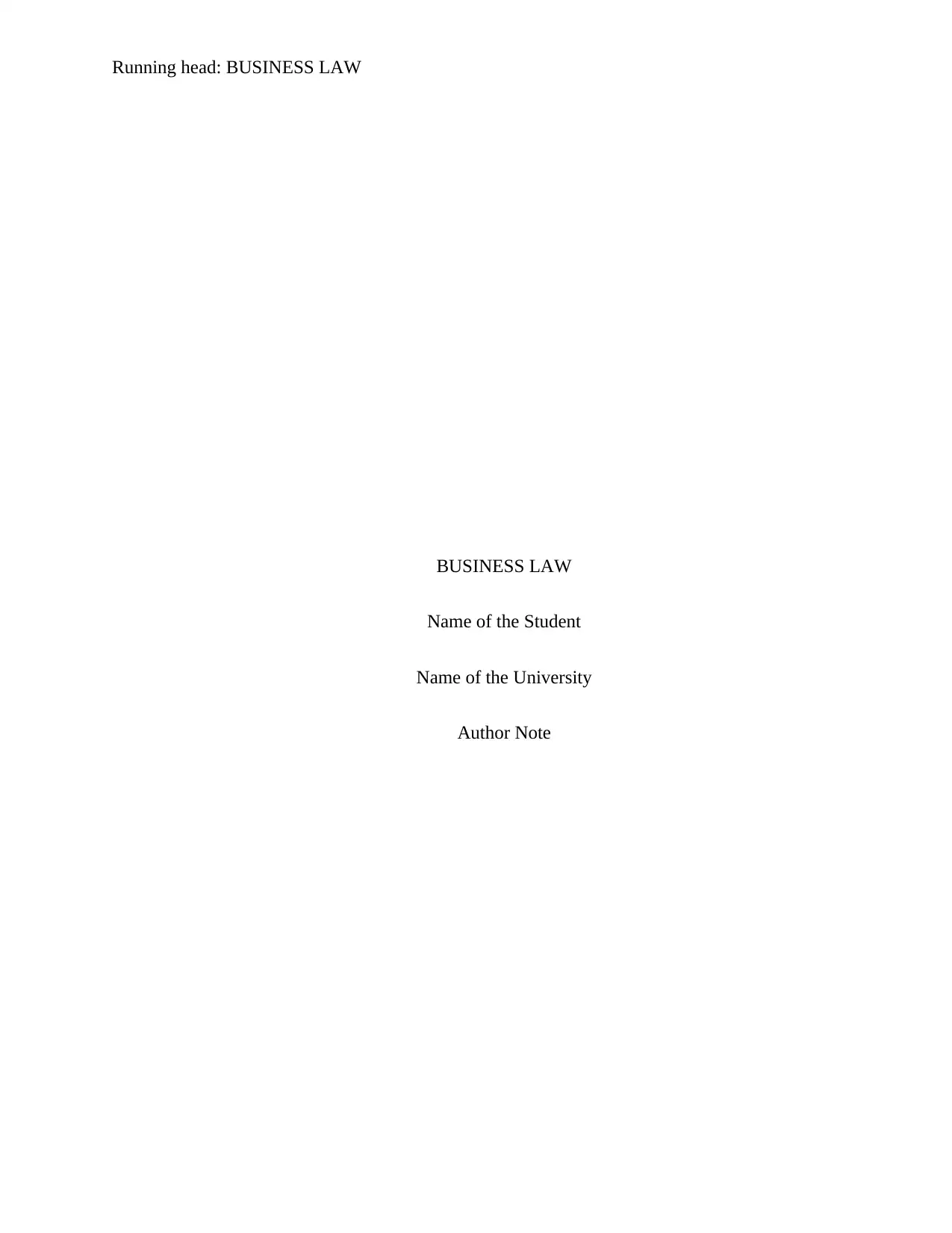
Running head: BUSINESS LAW
BUSINESS LAW
Name of the Student
Name of the University
Author Note
BUSINESS LAW
Name of the Student
Name of the University
Author Note
Paraphrase This Document
Need a fresh take? Get an instant paraphrase of this document with our AI Paraphraser
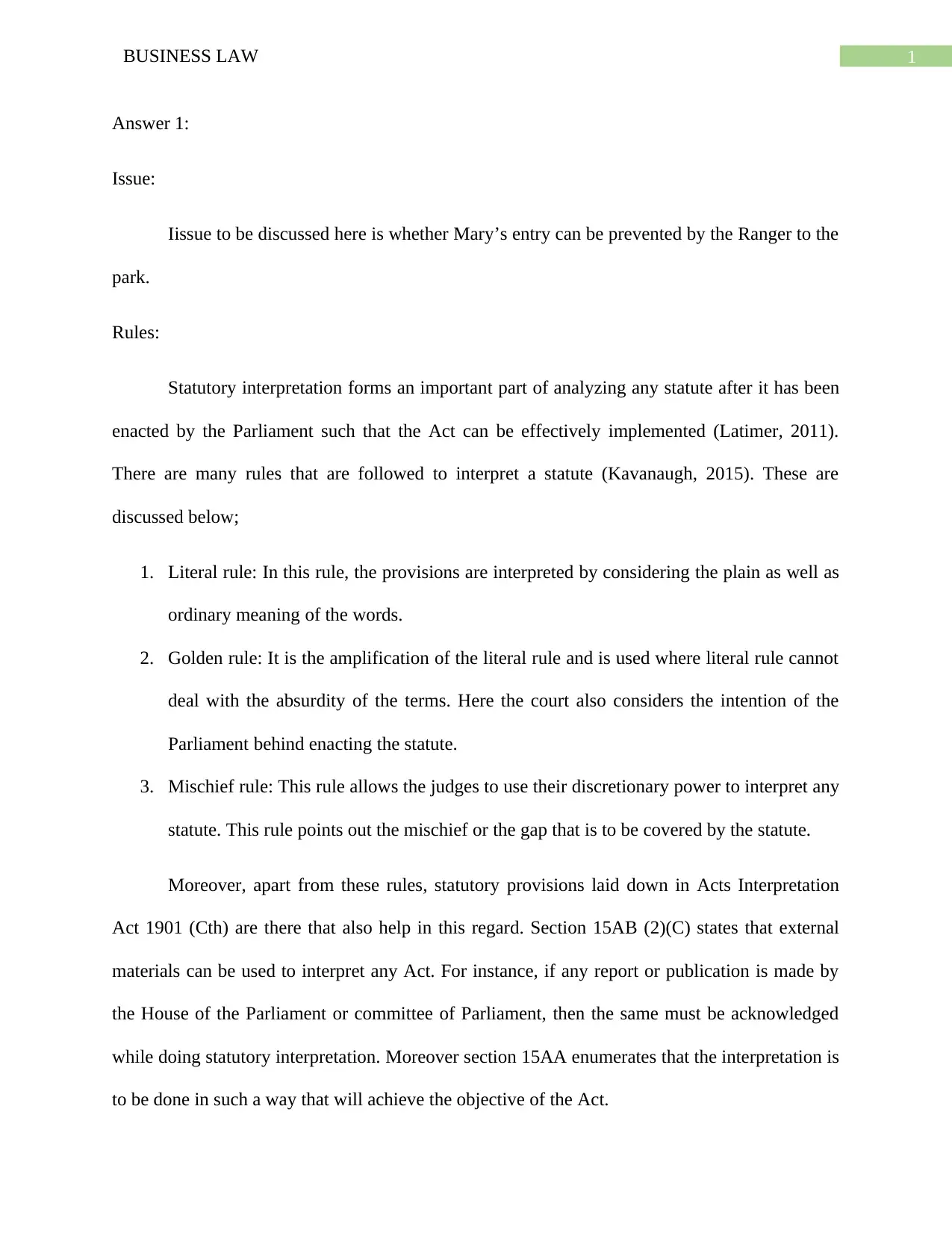
1BUSINESS LAW
Answer 1:
Issue:
Iissue to be discussed here is whether Mary’s entry can be prevented by the Ranger to the
park.
Rules:
Statutory interpretation forms an important part of analyzing any statute after it has been
enacted by the Parliament such that the Act can be effectively implemented (Latimer, 2011).
There are many rules that are followed to interpret a statute (Kavanaugh, 2015). These are
discussed below;
1. Literal rule: In this rule, the provisions are interpreted by considering the plain as well as
ordinary meaning of the words.
2. Golden rule: It is the amplification of the literal rule and is used where literal rule cannot
deal with the absurdity of the terms. Here the court also considers the intention of the
Parliament behind enacting the statute.
3. Mischief rule: This rule allows the judges to use their discretionary power to interpret any
statute. This rule points out the mischief or the gap that is to be covered by the statute.
Moreover, apart from these rules, statutory provisions laid down in Acts Interpretation
Act 1901 (Cth) are there that also help in this regard. Section 15AB (2)(C) states that external
materials can be used to interpret any Act. For instance, if any report or publication is made by
the House of the Parliament or committee of Parliament, then the same must be acknowledged
while doing statutory interpretation. Moreover section 15AA enumerates that the interpretation is
to be done in such a way that will achieve the objective of the Act.
Answer 1:
Issue:
Iissue to be discussed here is whether Mary’s entry can be prevented by the Ranger to the
park.
Rules:
Statutory interpretation forms an important part of analyzing any statute after it has been
enacted by the Parliament such that the Act can be effectively implemented (Latimer, 2011).
There are many rules that are followed to interpret a statute (Kavanaugh, 2015). These are
discussed below;
1. Literal rule: In this rule, the provisions are interpreted by considering the plain as well as
ordinary meaning of the words.
2. Golden rule: It is the amplification of the literal rule and is used where literal rule cannot
deal with the absurdity of the terms. Here the court also considers the intention of the
Parliament behind enacting the statute.
3. Mischief rule: This rule allows the judges to use their discretionary power to interpret any
statute. This rule points out the mischief or the gap that is to be covered by the statute.
Moreover, apart from these rules, statutory provisions laid down in Acts Interpretation
Act 1901 (Cth) are there that also help in this regard. Section 15AB (2)(C) states that external
materials can be used to interpret any Act. For instance, if any report or publication is made by
the House of the Parliament or committee of Parliament, then the same must be acknowledged
while doing statutory interpretation. Moreover section 15AA enumerates that the interpretation is
to be done in such a way that will achieve the objective of the Act.
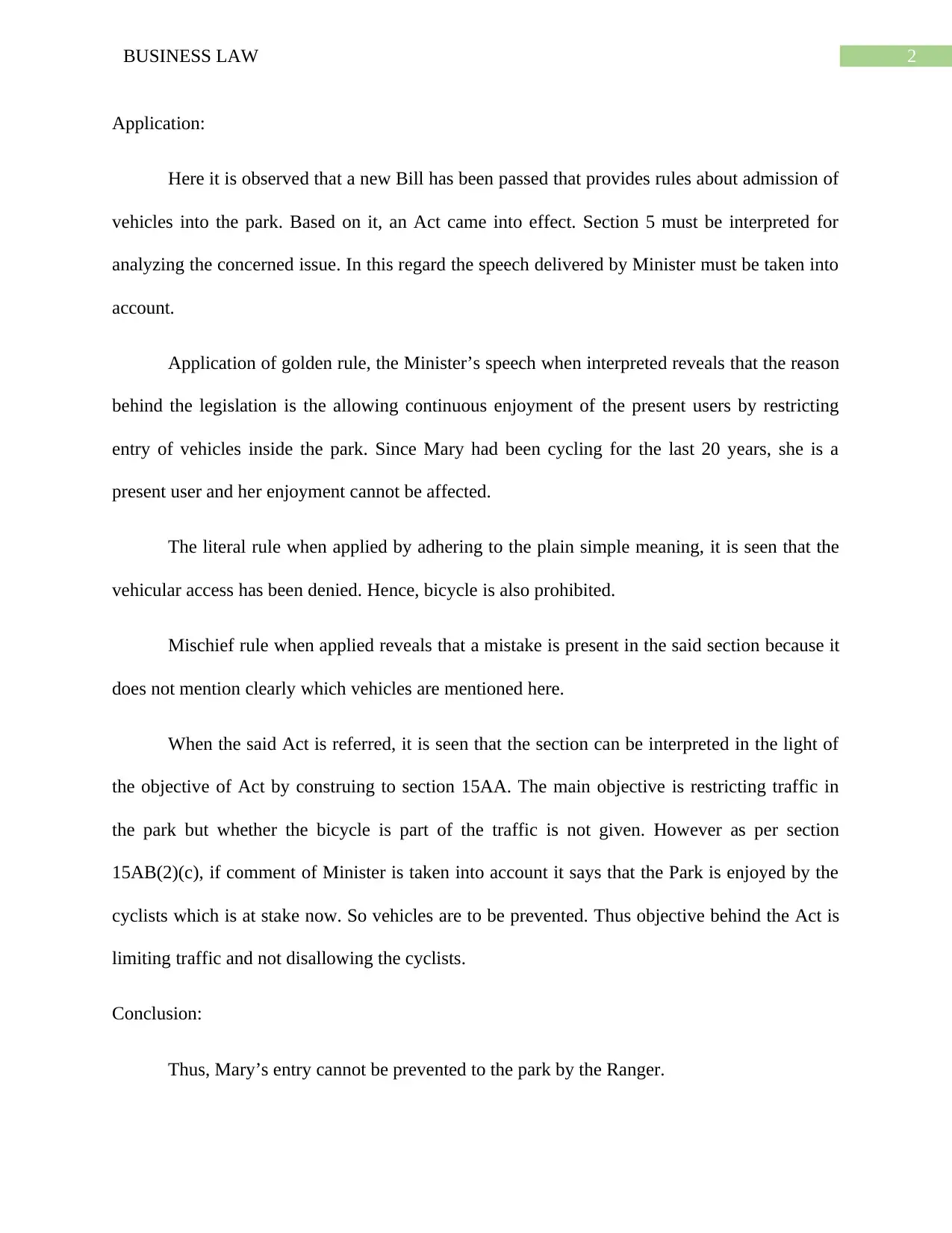
2BUSINESS LAW
Application:
Here it is observed that a new Bill has been passed that provides rules about admission of
vehicles into the park. Based on it, an Act came into effect. Section 5 must be interpreted for
analyzing the concerned issue. In this regard the speech delivered by Minister must be taken into
account.
Application of golden rule, the Minister’s speech when interpreted reveals that the reason
behind the legislation is the allowing continuous enjoyment of the present users by restricting
entry of vehicles inside the park. Since Mary had been cycling for the last 20 years, she is a
present user and her enjoyment cannot be affected.
The literal rule when applied by adhering to the plain simple meaning, it is seen that the
vehicular access has been denied. Hence, bicycle is also prohibited.
Mischief rule when applied reveals that a mistake is present in the said section because it
does not mention clearly which vehicles are mentioned here.
When the said Act is referred, it is seen that the section can be interpreted in the light of
the objective of Act by construing to section 15AA. The main objective is restricting traffic in
the park but whether the bicycle is part of the traffic is not given. However as per section
15AB(2)(c), if comment of Minister is taken into account it says that the Park is enjoyed by the
cyclists which is at stake now. So vehicles are to be prevented. Thus objective behind the Act is
limiting traffic and not disallowing the cyclists.
Conclusion:
Thus, Mary’s entry cannot be prevented to the park by the Ranger.
Application:
Here it is observed that a new Bill has been passed that provides rules about admission of
vehicles into the park. Based on it, an Act came into effect. Section 5 must be interpreted for
analyzing the concerned issue. In this regard the speech delivered by Minister must be taken into
account.
Application of golden rule, the Minister’s speech when interpreted reveals that the reason
behind the legislation is the allowing continuous enjoyment of the present users by restricting
entry of vehicles inside the park. Since Mary had been cycling for the last 20 years, she is a
present user and her enjoyment cannot be affected.
The literal rule when applied by adhering to the plain simple meaning, it is seen that the
vehicular access has been denied. Hence, bicycle is also prohibited.
Mischief rule when applied reveals that a mistake is present in the said section because it
does not mention clearly which vehicles are mentioned here.
When the said Act is referred, it is seen that the section can be interpreted in the light of
the objective of Act by construing to section 15AA. The main objective is restricting traffic in
the park but whether the bicycle is part of the traffic is not given. However as per section
15AB(2)(c), if comment of Minister is taken into account it says that the Park is enjoyed by the
cyclists which is at stake now. So vehicles are to be prevented. Thus objective behind the Act is
limiting traffic and not disallowing the cyclists.
Conclusion:
Thus, Mary’s entry cannot be prevented to the park by the Ranger.
⊘ This is a preview!⊘
Do you want full access?
Subscribe today to unlock all pages.

Trusted by 1+ million students worldwide
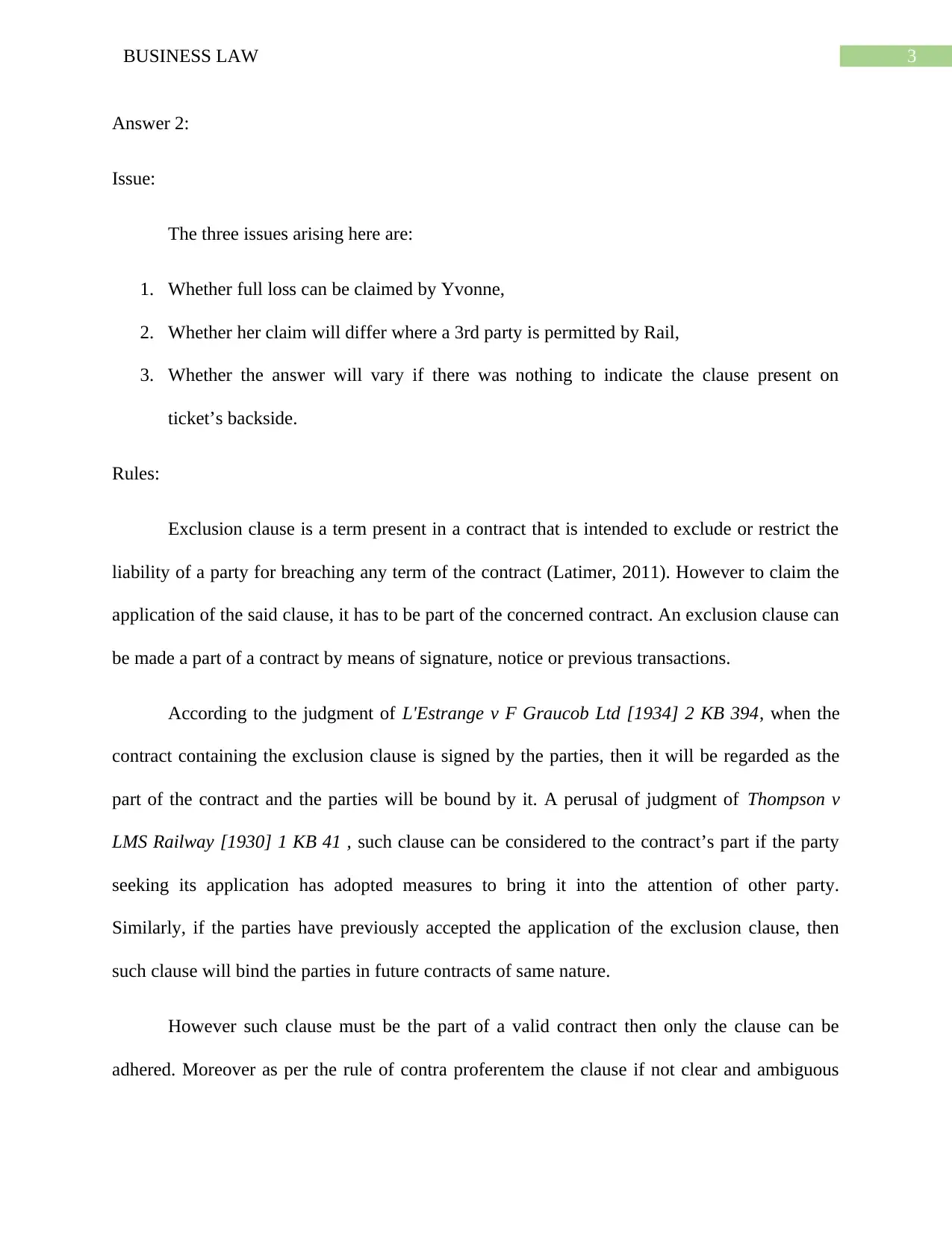
3BUSINESS LAW
Answer 2:
Issue:
The three issues arising here are:
1. Whether full loss can be claimed by Yvonne,
2. Whether her claim will differ where a 3rd party is permitted by Rail,
3. Whether the answer will vary if there was nothing to indicate the clause present on
ticket’s backside.
Rules:
Exclusion clause is a term present in a contract that is intended to exclude or restrict the
liability of a party for breaching any term of the contract (Latimer, 2011). However to claim the
application of the said clause, it has to be part of the concerned contract. An exclusion clause can
be made a part of a contract by means of signature, notice or previous transactions.
According to the judgment of L'Estrange v F Graucob Ltd [1934] 2 KB 394, when the
contract containing the exclusion clause is signed by the parties, then it will be regarded as the
part of the contract and the parties will be bound by it. A perusal of judgment of Thompson v
LMS Railway [1930] 1 KB 41 , such clause can be considered to the contract’s part if the party
seeking its application has adopted measures to bring it into the attention of other party.
Similarly, if the parties have previously accepted the application of the exclusion clause, then
such clause will bind the parties in future contracts of same nature.
However such clause must be the part of a valid contract then only the clause can be
adhered. Moreover as per the rule of contra proferentem the clause if not clear and ambiguous
Answer 2:
Issue:
The three issues arising here are:
1. Whether full loss can be claimed by Yvonne,
2. Whether her claim will differ where a 3rd party is permitted by Rail,
3. Whether the answer will vary if there was nothing to indicate the clause present on
ticket’s backside.
Rules:
Exclusion clause is a term present in a contract that is intended to exclude or restrict the
liability of a party for breaching any term of the contract (Latimer, 2011). However to claim the
application of the said clause, it has to be part of the concerned contract. An exclusion clause can
be made a part of a contract by means of signature, notice or previous transactions.
According to the judgment of L'Estrange v F Graucob Ltd [1934] 2 KB 394, when the
contract containing the exclusion clause is signed by the parties, then it will be regarded as the
part of the contract and the parties will be bound by it. A perusal of judgment of Thompson v
LMS Railway [1930] 1 KB 41 , such clause can be considered to the contract’s part if the party
seeking its application has adopted measures to bring it into the attention of other party.
Similarly, if the parties have previously accepted the application of the exclusion clause, then
such clause will bind the parties in future contracts of same nature.
However such clause must be the part of a valid contract then only the clause can be
adhered. Moreover as per the rule of contra proferentem the clause if not clear and ambiguous
Paraphrase This Document
Need a fresh take? Get an instant paraphrase of this document with our AI Paraphraser
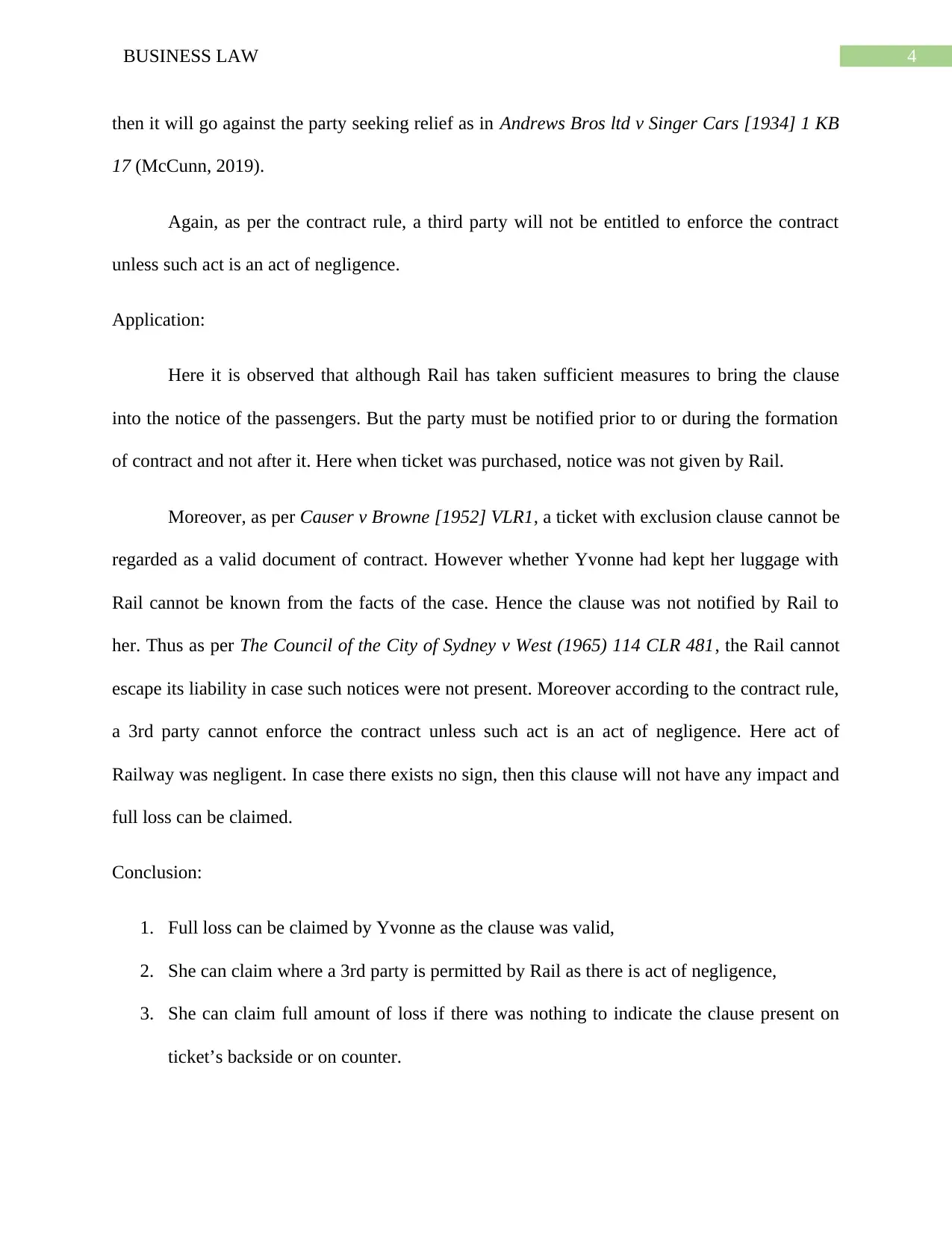
4BUSINESS LAW
then it will go against the party seeking relief as in Andrews Bros ltd v Singer Cars [1934] 1 KB
17 (McCunn, 2019).
Again, as per the contract rule, a third party will not be entitled to enforce the contract
unless such act is an act of negligence.
Application:
Here it is observed that although Rail has taken sufficient measures to bring the clause
into the notice of the passengers. But the party must be notified prior to or during the formation
of contract and not after it. Here when ticket was purchased, notice was not given by Rail.
Moreover, as per Causer v Browne [1952] VLR1, a ticket with exclusion clause cannot be
regarded as a valid document of contract. However whether Yvonne had kept her luggage with
Rail cannot be known from the facts of the case. Hence the clause was not notified by Rail to
her. Thus as per The Council of the City of Sydney v West (1965) 114 CLR 481, the Rail cannot
escape its liability in case such notices were not present. Moreover according to the contract rule,
a 3rd party cannot enforce the contract unless such act is an act of negligence. Here act of
Railway was negligent. In case there exists no sign, then this clause will not have any impact and
full loss can be claimed.
Conclusion:
1. Full loss can be claimed by Yvonne as the clause was valid,
2. She can claim where a 3rd party is permitted by Rail as there is act of negligence,
3. She can claim full amount of loss if there was nothing to indicate the clause present on
ticket’s backside or on counter.
then it will go against the party seeking relief as in Andrews Bros ltd v Singer Cars [1934] 1 KB
17 (McCunn, 2019).
Again, as per the contract rule, a third party will not be entitled to enforce the contract
unless such act is an act of negligence.
Application:
Here it is observed that although Rail has taken sufficient measures to bring the clause
into the notice of the passengers. But the party must be notified prior to or during the formation
of contract and not after it. Here when ticket was purchased, notice was not given by Rail.
Moreover, as per Causer v Browne [1952] VLR1, a ticket with exclusion clause cannot be
regarded as a valid document of contract. However whether Yvonne had kept her luggage with
Rail cannot be known from the facts of the case. Hence the clause was not notified by Rail to
her. Thus as per The Council of the City of Sydney v West (1965) 114 CLR 481, the Rail cannot
escape its liability in case such notices were not present. Moreover according to the contract rule,
a 3rd party cannot enforce the contract unless such act is an act of negligence. Here act of
Railway was negligent. In case there exists no sign, then this clause will not have any impact and
full loss can be claimed.
Conclusion:
1. Full loss can be claimed by Yvonne as the clause was valid,
2. She can claim where a 3rd party is permitted by Rail as there is act of negligence,
3. She can claim full amount of loss if there was nothing to indicate the clause present on
ticket’s backside or on counter.
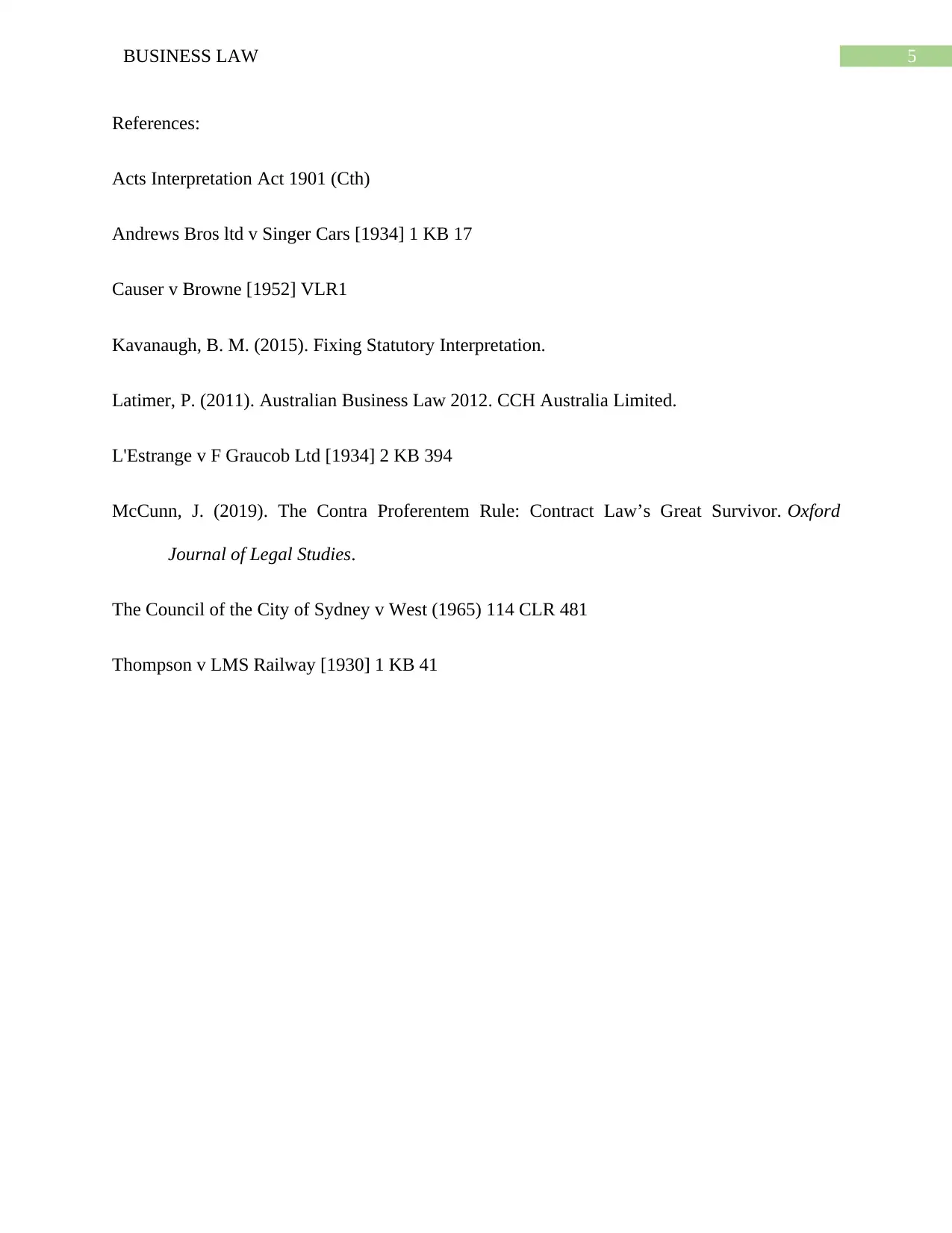
5BUSINESS LAW
References:
Acts Interpretation Act 1901 (Cth)
Andrews Bros ltd v Singer Cars [1934] 1 KB 17
Causer v Browne [1952] VLR1
Kavanaugh, B. M. (2015). Fixing Statutory Interpretation.
Latimer, P. (2011). Australian Business Law 2012. CCH Australia Limited.
L'Estrange v F Graucob Ltd [1934] 2 KB 394
McCunn, J. (2019). The Contra Proferentem Rule: Contract Law’s Great Survivor. Oxford
Journal of Legal Studies.
The Council of the City of Sydney v West (1965) 114 CLR 481
Thompson v LMS Railway [1930] 1 KB 41
References:
Acts Interpretation Act 1901 (Cth)
Andrews Bros ltd v Singer Cars [1934] 1 KB 17
Causer v Browne [1952] VLR1
Kavanaugh, B. M. (2015). Fixing Statutory Interpretation.
Latimer, P. (2011). Australian Business Law 2012. CCH Australia Limited.
L'Estrange v F Graucob Ltd [1934] 2 KB 394
McCunn, J. (2019). The Contra Proferentem Rule: Contract Law’s Great Survivor. Oxford
Journal of Legal Studies.
The Council of the City of Sydney v West (1965) 114 CLR 481
Thompson v LMS Railway [1930] 1 KB 41
⊘ This is a preview!⊘
Do you want full access?
Subscribe today to unlock all pages.

Trusted by 1+ million students worldwide
1 out of 6
Related Documents
Your All-in-One AI-Powered Toolkit for Academic Success.
+13062052269
info@desklib.com
Available 24*7 on WhatsApp / Email
![[object Object]](/_next/static/media/star-bottom.7253800d.svg)
Unlock your academic potential
Copyright © 2020–2026 A2Z Services. All Rights Reserved. Developed and managed by ZUCOL.





